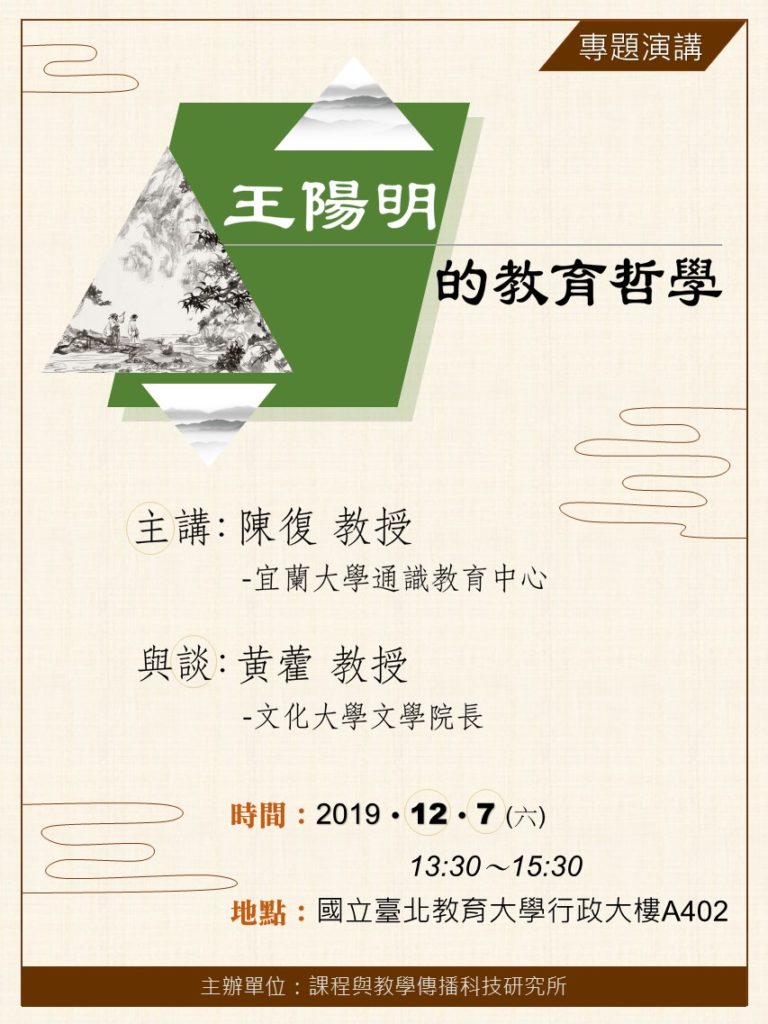12/28(六)臺灣教育哲學演講活動
臺灣教育哲學會演講活動
主講人:Martin Schonfeld (South Florida University)
講題: Reflecting on the Paradigm Shift: Philosophy and Liberalism in the Anthropocene
時間:2019年12月28日(六)09:30開始
地點:臺北市立大學博愛校區勤樸樓301會議室
通識教育跨校經典研讀會2019年12月研讀活動
科技部人文社會研究中心贊助通識教育跨校經典研讀會
2019年12月研讀活動
本學期研讀書籍:George Anders, (2017) You Can Do Anything: The Surprising Power of a “Useless” Liberal Arts Education, Little, Brown and Company.
Chap. 11 Prepared Forever, pp.247-270
導讀老師:楊洲松 老師 主持:游振鵬 老師
Chap. 12 Telling Your Story, pp.271-281
導讀老師:林麗珊 老師
Chap. 13 Getting Paid Properly, pp.282-292
導讀老師:陳濼翔 老師 主持:張鍠焜 老師
Snacks for the Road, pp.293-304
導讀老師:蔡傳暉 老師
時間:108年12月14日(星期六) 12:00-16:30
地點:台北市立大學勤樸樓3F會議室
竭誠歡迎各位老師與同學參加,中午提供便當,請回函告知助理,是否用餐或有素食需求。
讀書會助理:詹昀庭
E-mail: leia180687@gmail.com (M): 0912-766 618
《臺灣教育哲學》第三卷第二期已出刊!
本期文章目錄
- 李彥儀/當代漢語教育哲學對荀子「禮教」的研究述評( A Review of the Studies on Xunzi’s Ritual Education in Contemporary Chinese Philosophy of Education)
- 但昭偉/臺灣教育有那麽糟嗎? (Is Education in Taiwan as Bad as the General Public Assumed?)
- 張威克/反思教育與死刑 (Reflection on Education and Death Penalty)
- 何儒育/核心素養視域下高中哲學之課程建構與教學:以臺北市某市立高中「哲學與創意思維」課程為例 (Discussion on the Discourses of Curriculum Designs and Teaching of the Philosophy-Course in the Vision of Competency-Based: “Philosophy and Creative Thinking” at a Senior High School in Taipei)
12/07(六)教育哲學專題演講

時間:2019年12月7日 13:30-15:30
地點:國立臺北教育大學行政大樓A402
講題:王陽明的教育哲學
講者:陳復教授(宜蘭大學通識教育中心)
與談人:黃藿教授(文化大學文學院長)
本會第四屆年會辦理大學生「教育哲史基礎研究圓桌論壇」與「能力取向與教育研究工作坊」相關訊息
臺灣教育哲學學會公告
主旨:為鼓勵年輕學子關注教育哲史基礎研究以及國際新興思潮之發展,規劃結合本會第四屆年會辦理「教育哲史基礎研究圓桌論壇」與「能力取向與教育研究工作坊」,期能達成教育哲史研究人才向下紥根之目標。
說明:
一、依據2019.10.09第二屆第五次理監事會議建議事項辦理。
二、「『未來教育的哲學省思』研討會暨臺灣教育哲學學會第四屆年會」訂於2020年4月23日至25日假國立臺北教育大學辦理,詳細訊息請參閱https://sites.google.com/view/phiedusoc
三、為鼓勵大學部學生(大三、大四以上)關注教育哲史基礎研究,還請本會會員結合教育哲學、教育議題、教育專題或其他相關課程,協助指導大學部學生參與學會活動。大學部學生論文將安排「教育哲史基礎研究圓桌論壇」場次發表,並由主辦單位發給發表證明,期以達成教育哲史研究人才向下紥根之目標。
四、為擴大本學會之國際交流,本次會年會同時於2020年4月23日(全天)辦理” Workshop on Capabilities Approach and Educational Research”。
(1)工作坊邀請 prof. Melanie Walker & Dr. Liz Jackson擔任主講者,活動進行方式如下:
| Workshop on Capabilities Approach and Educational Research 講者:Prof. Melanie Walker, Dr. Liz Jackson & Prof. Chun-Ping Wang 日期:2020年4月23日 地點:國立臺北教育大學行政大樓A402 |
| 09:00-9:30 |
| 報到/領取工作坊資料 |
| 09:30-10:00 |
| Introduction: Development of Capabilities Approach |
| 10:00-11:00 |
| Core Ideas of Capabilities Approach |
| 11:00-11:10 |
| Tea break |
| 11:10-12:10 |
| Examples (or cases) of Capabilities Approach on Educational Issue |
| 12:10-13:30 |
| Proposal presentation and discussion |
(2)邀請學會會員或指導之碩博士研究生提出「能力取向之教育應用研究計畫(或論文)」,以利工作坊發表與討論之安排。
五、有關「教育哲史基礎研究圓桌論壇」或「能力取向與教育研究工作坊」之參與事宜,煩請協告知,電話02-77321104# 82081(王俊斌)或urnlchunping@tea.ntue.edu.tw 。
通識教育跨校經典研讀會2019年11月研讀活動
科技部人文社會研究中心贊助通識教育跨校經典研讀會
2019年11月研讀活動
本學期研讀書籍:George Anders, (2017) You Can Do Anything: The Surprising Power of a “Useless” Liberal Arts Education, Little, Brown and Company.
Chap.7 Ruling the World, pp.149- 175
導讀老師:何佳瑞 老師 主持:蔡傳暉 老師
Chap.8 Employer That Get IT, pp.177-200
導讀老師:鍾怡慧 老師
Chap.9 Your Alumni Connection, pp.201-224
導讀老師:張鍠焜 老師 主持:林麗珊 老師
Chap.10 What Your Campus Can Do, pp.225-246
導讀老師:方永泉 老師
時間:108年11月16日(星期六) 12:00-16:30
地點:台北市立大學勤樸樓3F會議室
竭誠歡迎各位老師與同學參加,中午提供便當,請回函告知助理,是否用餐或有素食需求。
讀書會助理:詹昀庭
E-mail: leia180687@gmail.com (M): 0912-766 618